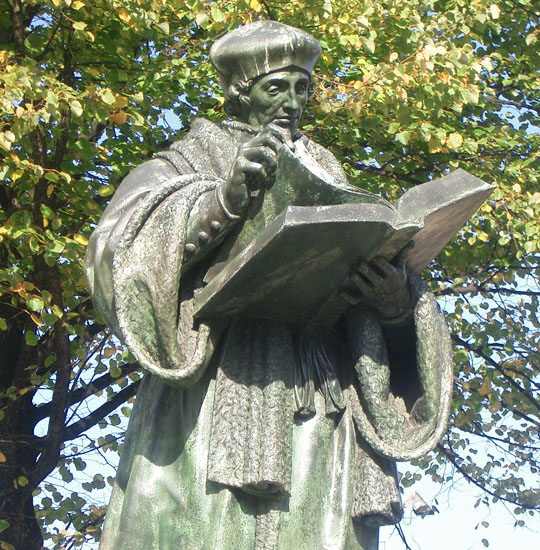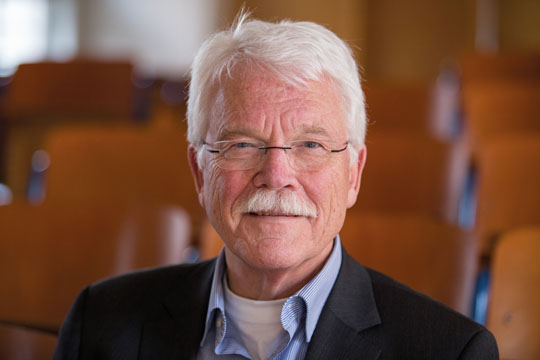More chances with the Erasmus Prize
Freiburg, Nov 24, 2017
Every year, the University College Freiburg (UCF) awards the Erasmus Prize for the Liberal Arts and Sciences for outstanding final papers. Now, the prize, which is sponsored by the Freiburg-Nördlicher Breisgau Sparkasse, is being divided into two categories. Verena Adt spoke with the chair of the board of trustees, specialist in ancient history Prof. Dr. Hans-Joachim Gehrke, who is involved on behalf of the UCF as Director of Outreach.
 University College Freiburg’s prize is named after Erasmus of Rotterdam, one of the most important proponents of humanism in Europe in the 16th century.
University College Freiburg’s prize is named after Erasmus of Rotterdam, one of the most important proponents of humanism in Europe in the 16th century.
Photo: Frank Versteegen/ Wikimedia Commons, CC BY-SA 3.0
Mr Gehrke, how come such a young institution as the UCF, which has only existed since 2012, has already awarded a prize to support young academic talent five times?
Hans-Joachim Gehrke: From the start, the idea was to clearly distinguish the University College Freiburg to the outside world with a prize and an award ceremony, and at the same time to highlight the college’s position within the university.
 The Erasmus Prize is also intended to help establish University College as part of the University of Freiburg, says Hans-Joachim Gehrke.
The Erasmus Prize is also intended to help establish University College as part of the University of Freiburg, says Hans-Joachim Gehrke.
Photo: Silvia Wolf
What are the criteria for submitted works?
First of all, they have to be final papers that are submitted at the University of Freiburg, and so far this has been in all categories: both bachelor and master theses as well as dissertations and post-doc theses, from all faculties. There must be at least one of two components as content: one is a methodological, epistemological aspect, because this is one of our themes at the UCF. The second option is that the perspective should unify several disciplines.
This interdisciplinary aspect is also part of the DNA of the UCF …
That was our central idea from the start. The logic of research leads to increasing specialization. We know more and more about less and less. At some point this leads to problems, [both] in academic life, but also outside it is very bad if you no longer any have a view of the whole.
What financial resources does the prize bring?
Extremely generous! Five thousand euros is a considerable amount. The Sparkasse also funds the award ceremony. With this partnership we were also driven by the idea that we should maintain a connection with SMEs, which the Sparkasse in particular embodies. We want our students to be familiar with business, to do internships and maybe also not to continue straight on from a bachelor degree to more studies and instead to take up a profession first of all. The employability of our students is one of our goals.
Why are you planning to award the Erasmus Prize will be awarded in two categories in future, instead of just one?
In the beginning we said that bachelor and master theses should also have a chance. In fact, the first Erasmus Prize was awarded for a master thesis. But as time has passed it has become clear that even excellent master theses don’t really have a chance against excellent doctoral theses. Master theses tend to be more discipline-related and don’t have as much to do with our concept of interdisciplinarity or methodology. So we realized that it didn’t actually work.
How have your solved the problem?
In consultation with our partners at the Sparkasse, we decided to divide the prize. There are now two categories: one for final papers at bachelor and master level, another for dissertations and post-doc theses. The prize money is also being divided: two thousand euros for a bachelor or master theses, that’s a very high prize, and three thousand euros for a dissertation or post-doc thesis, which is still a very considerable sum. We are announcing it in this form now for 2018 for the first time. Then the college will also be making proposals for potentially prize-winning work.
Erasmus Prize 2018
The University College Freiburg is accepting applications for this year’s Erasmus Prize award from now until 1st February 2018.
Details of the award
Previous prize-winners

